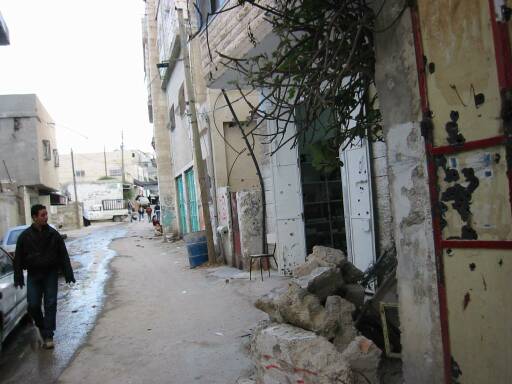|

Monday, October 22
A war came over Bethlehem. On Monday morning early, at a quiet moment when the taxis start driving again over the desolated streets, I dare to leave our house. It feels like the morning after. The windows of the nearby Hodali building at Cinema square are all broken. The street is full of glass, and the stones of the surrounding houses show white bullet holes. There are damaged or destroyed cars along the streets, burnt tyres, garbage holders fallen aside, rocks everywhere, a smell of powder smoke. The bakeries and pharmacies are closed. Today the schools, Bethlehem University, shops and public institutions will be closed too. The Qara'a building near Bab al-Zqaaq, where at better moments the Bethlehemites are used to hold their parties, is severely damaged; some floors are burnt out from inside and outside. Like scenes of Beirut during the Lebanese civil war. During the past days gun battles raged between the Israeli army and young Palestinian gunmen, apparently from all Palestinian factions. Tanks entered into a significant part of the northern section of Bethlehem, including 'Azza camp, the University Road, and even into the main street Madbasseh. Monday morning early, there is only sporadic shooting. Otherwise, an eery silence, passers by watching their surroundings with disbelief.
***
No doubt, the Israeli army has been using violence indiscriminately and disproportionally. While leaving the Church of Nativity on Saturday, a young man was killed on Manger Square by ammunition fired from the Ta'amreh area, some three kilometers to the east. The day before, a woman of Beit Jala fled into a shop for safety but was shot in the neck and died. At a checkpoint not far from Bethlehem a woman at the moment of delivery was held up by soldiers and died together with her child. Dozens of people were injured due to shellings directed at civilian apartments and buildings. The Antoniana building for the elderly was damaged, even the Husseini hospital on the road to Beit Jala. According to local TV, a man was injured or killed while standing inside the hospital. Yesterday Palestinian fireworkers could not appropriately extinguish a fire in Azza camp due to Israeli shooting. Few could leave their house due to the ongoing reign of terror. Since the June 1967 war, it has not occurred that one could not feel safe in any place in town. Now, on Monday morning, the people come out and breathe a little, don't know what to say.
* * *
Sneaking through little streets, I yesterday visited a press conference held by the mayor of Bethlehem, Hannah Nasir, and Salah Tamari, a member of the Legislative Council of the Palestinian National Authority. Only few foreign journalists were present. Perhaps they were not interested due to the war in Afghanistan, as Tamari said, or because it was difficult to enter Bethlehem safely. The mayor called the Israeli entrance into the PNA areas "state terrorism" and a dangerous escalation, and asserted that this policy was intended to kill the option of re-starting the peace process. I ask him about the need for international observers. The Dutch initiative "United Civilians for Peace," of which I am the local coordinator, brings in Dutch civilian observers in various Palestinian areas who work for Palestinian and Israeli human rights and peace organizations. However, the press conference is suddenly broken up because of the news that a boy from 'Azza camp was killed.
* * *
Israeli tanks were passing by my house, at the entrance of 'Azza camp, and also by the house of my family in law on the Bethlehem University Road. There was continuous shooting, from Friday on, during both the night and the day. We were forced to stay at home at my family in law's, me sneaking out at some opportune moments to bring in food from our own house. Mary, my Palestinian wife, was tired of sitting and started walking in the house. Our daughter Jara of almost four, was all the time jumping around, in need to release her energy. When shelling was very heavy, my family stayed in the bathroom. Mary and Jara built a logo house there, to kill the time. Using a plastic filter as megaphone, Jara chanted a rhyme that her school kids had adapted to suit political circumstances:
Battich, Shamaam
Sharon dzahlak fi hammaam
(Watermellon, yellow mellon
Sharon slips in the bathroom).
Fortunately, she still does not know the connection between shooting and pain and injuries. "Leesh wawa?" (Why is there pain?), she asks when she sees the injured people on TV. And when we want to take herb tea while the shooting is going on, she proposes to pick the herbs outside in the garden. No way.
I am calling with the Dutch volunteers and the Dutch press. Friends and family are calling too and we keep ourselves busy watching TV (we'll see our street on the Qatari Al-Jazira station) and answering phone calls. Jara takes a shoe in her hand as if it is a mobile phone, starts talking loudly, walking emphatically in the room, making gestures with her arm. The local TV appeals to give food and bread to those needed in the area, and there are also calls for donating blood. A journalist asks whether in all those six year I live here I never thought about leaving. I respond that my wife's family is here. And, when the people leave, what will be left of Bethlehem?
Toine van Teeffelen
|
